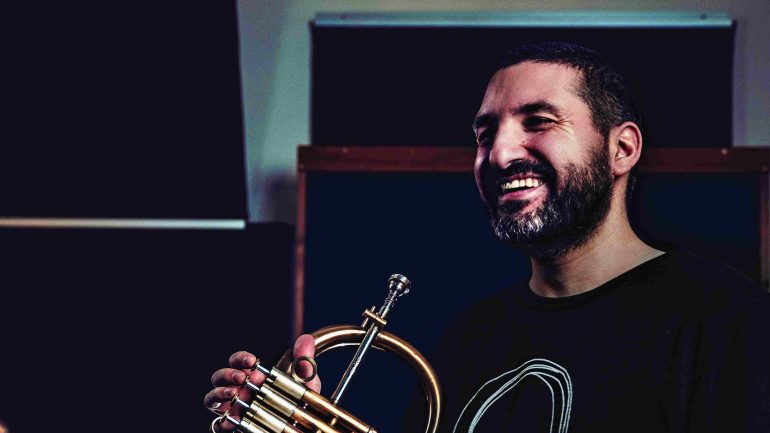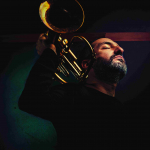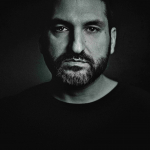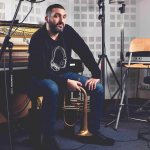Meeting with Ibrahim Maalouf, iconic artist and trumpet virtuoso, several times nominated for the Grammy Awards. Between jazz, oriental influences and prestigious collaborations, the musician reveals his captivating universe. Ibrahim shares with us his love of music, his exceptional journey and perfumes
which punctuate his life, to the delight of LiFE Magazine readers.
Ibrahim, your music is a unique blend of jazz and Eastern influences. How do you manage to create such a captivating fusion?
I actually believe it’s a blend of my musical education linked to both Western and Arab classical music, jazz which I obviously adore, and a variety of musical styles I’ve been listening to since my adolescence, and perhaps even before that, mixing pop, rock, hard rock, African music, Indian music, South American music, and electronic music. We are living in an era where all cultures of the world are freely accessible with just a click, thanks to a miniature device in our pockets. It’s inconceivable not to be inspired by all these influences, each of which has something exciting to offer.
As a renowned artist, what are your main sources of inspiration when composing new musical works?
Beyond specific stylistic inspirations, I believe that what inspires me the most is life itself. As the great filmmaker Claude Lelouch, with whom I recently had the immense honor of working, once said, «Life is the best screenwriter in the world.» I strongly believe in this philosophy, which ultimately suggests that there’s nothing more inspiring than life and human relationships. It’s a philosophy I apply at every moment, and when I’m composing music, it’s the first thing, perhaps the only thing, that guides the writing process.
You’ve been nominated multiple times for Grammy Awards. What do these recognitions mean to you as an artist?
It’s always challenging to react in a balanced way when receiving an honor, distinction, or award. It’s both very encouraging, as it gives me the feeling that the work I do doesn’t go unnoticed and that it’s somehow recognized for the commitment and passion I have for this profession. But on the other hand, I know that there’s a bit of chance involved and perhaps also the alignment of stars. (Smile) And what I tell my family and friends is that in such cases, one must know how to celebrate, enjoy this moment of joy, while keeping one’s feet on the ground and realizing that these little moments of happiness are a gift from life. Once it’s over, ultimately nothing really changes, and perhaps that’s for the better.
Your collaborations with big names in music, such as Sting, have made an impact. How have these experiences influenced your musical journey?
When I think of Sting and a few other very great artists I’ve had the honor of collaborating with, I immediately think of the humility of the majority of them. Beyond their experience and demands, I’m often struck by the contrast between the image one might have of strong personalities who have truly marked the cultures of an entire era, like Quincy Jones or Sharon Stone, with whom I collaborated, and their fundamental humanity, which remains touching and humble.
Let’s talk about your role as an ambassador for the luxury perfume brand «Amaffi.» How do music and perfumes interact in your creative and personal life?
To be honest, I was surprised when this luxury perfume brand approached me. Although I’m not a model, it may indicate a shift in contemporary perceptions of beauty. I believe that emotional attachment can be more enticing than aesthetics. Brands seem to understand that deeply touching customers is crucial today. Some seem to have an emotional connection with my music, which motivated Amaffi to include me in this beautiful project, and that touches me immensely.
Your latest album has been a great success. What story did you want to tell through these new compositions?
Looking back, I realize that I tell the same story in all my albums, but in various ways with sometimes opposing words. For the past few years, my music has aimed to reconcile people, cultures, generations, and even languages. Nothing very original, I simply talk about putting love at the center. In homage to Oum Kalthoum, I show that Arab and North American cultures share common values. «Capacity to Love» goes even further, simply expressing the importance of talking about love in an era focused on confrontation, where the word love may seem outdated to some.
The trumpet is your emblematic instrument. How did you discover your passion for this instrument, and how is it central to your artistic expression?
I grew up in a family of musicians, with a mother who played the piano and a father who played the trumpet. Although it may sound cliché (laughs), I’m fortunate to have a father who taught me the trumpet seriously. Initially, I didn’t appreciate this instrument, but after entering the Paris Conservatory and winning international competitions, I realized the importance of this heritage. My father invented a hybrid instrument over 60 years ago, a bridge between Western and Arab music. This instrument, like a magic wand, allows me today to create a unique language that represents me and that I couldn’t find anywhere else.
As an internationally renowned artist, what messages or emotions do you hope to convey to your audience through your music and your presence as an ambassador?
I believe that what drives me to do this job and compels me to create, invent, meet, stimulate, is once again this passion I have for human relationships and this desire to contribute to a form of balance that is indispensable, to a kindness that we must not neglect, and which perhaps can help to rebalance inequalities, to cleanse the relationships between people, to make this fleeting moment we share on earth a little more enjoyable.
Tell us about your upcoming album, which will be released in May!
I’m working simultaneously on several albums. «Trumpets of Michel- Ange,» the first to be released, is both rooted in history and timeless. This album celebrates transmission, heritage, and the passage of generations, symbolized by Michelangelo’s trumpets, giving meaning to the cycle of learning, evolution, and transmission. By exploring the history of French fanfares in the Lebanese mountains during the French mandate era, I tell how this cultural marriage shaped my current work. This is the legacy I would like to pass on to my children and the new generations after having lived and been transformed by our era.
What would you like to wish the readers of LiFE Magazine?
Unlike other art forms, music often doesn’t need words or explanations. While other artistic forms require explanations, music is content with a beating heart and a soul that feels. I wish the readers of LiFE Magazine to give as much importance to their emotions as to their reflections, beautifully interpreted by music.





